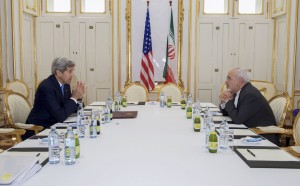“Kerry believes that a congressional rejection of the deal will lead to war.” — The Atlantic
 When the GOP presidential candidates convene Thursday for the televised Fox News pre-primary debate, they’re certain to unload on President Obama’s Iran nuclear deal negotiated by Secretary of State John Kerry. But it’s not enough to merely criticize the president’s policy. When they do, viewers and listeners should ask themselves, “What’s their alternative?”
When the GOP presidential candidates convene Thursday for the televised Fox News pre-primary debate, they’re certain to unload on President Obama’s Iran nuclear deal negotiated by Secretary of State John Kerry. But it’s not enough to merely criticize the president’s policy. When they do, viewers and listeners should ask themselves, “What’s their alternative?”
“I will negotiate a better deal.” That’s likely to be the most commonly heard tagline. But why should they — or you — believe they can? It would be incredibly naive to believe they can simply go back to Iran and get more by asking for more. That’s not how negotiation works. You don’t get what you want just because you demand it. Either you have to trade something for it, or you have to back up your demands with meaningful threats. Which brings us to …
The military option. Without any doubt, a least some Republicans want to eschew talk and take out Iran’s nuclear facilities by bombing them. But that’s far easier said than done. You would hope these politicians have a better grasp of history than their ignorant supporters, and even though they’re willing to play to the crowds in their rhetoric, they would be more circumspect about making actual decisions. But I’m not so sure.
Let’s talk about history. The planners who unleashed World War I expected it to be over in weeks. We all know how that turned out — and that the peace terms set the stage for World War II, a war we had to fight in which we won an unequivocal victory but it took an all-out effort and came at a frightful cost.
Now let’s turn to more recent history: America’s military track record since World War II. It’s hardly encouraging; we’re only 1-for-5 in major conflicts fought since then. Here’s the scorecard: Korea was a draw. Vietnam was a defeat. The Gulf War was a victory. Iraq and Afghanistan became long, drawn-out, bloody, and expensive quagmires like Vietnam, and while these wars got rid of Saddam and drove the Taliban from power, it’s hard to see what longer-term objectives, if any, they achieved — so they are at best limited, partial victories.
Given this track record, how can anyone be confident that unleashing bombers against Iran would turn out as America’s warmongers expect? The odds of that are slim indeed; such a military operation would likely produce, at best, only partial success in destroying Iran’s nuclear facilities. It likely would only delay Iran’s acquisition of nuclear weapons, and would guarantee an all-out effort by Iran to acquire such weapons. And the blowback would be tremendous. Do these people believe Iran would let us bomb their country, and kill Iranians, and do nothing about it?
I’m not a military expert, but certain things are clear enough that I think we can safely conclude that if the U.S. bombs Iran or encourages its Israeli ally to do so, the following will happen:
1. Iran will resist any U.S. attack with force, and might succeed in shooting down U.S. planes and capturing and/or killing U.S. pilots.
2. Iran will attack Persian Gulf shipping and try to close the Strait of Hormuz, disrupting world oil supplies and causing further harm to the struggling global economy.
3. Iran will attack U.S. naval shipping and aircraft in the Persian Gulf region to the extent it can, and given its military capabilities, we probably would suffer some vessel damage, aircraft losses, and human casualties.
4. Iran might attack civilian airliners within reach of its SAMs.
5. Iran probably would launch terrorist attacks against U.S. interests, facilities, and personnel in the Middle East, Europe, and possibly even on U.S. soil.
In short, it would be a war, and Iran would fight back wherever and however it could. If history teaches us anything at all, it is that military operations often go off the rails, and wars rarely turn out the way their instigators expected. Wars often make the problems they were meant to solve worse.
So as you listen to the GOP candidates attacks on Obama’s peace deal Thursday night, you should ask yourself: What is their alternative? Is it realistic? Will it work? Or, if they are given a free hand to implement it, will they merely make a giant mess of things as they did in Iraq and Afghanistan?
For Kerry’s perspective on the issue, you can read his interview with The Atlantic here.